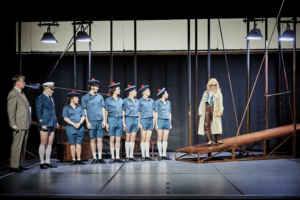
L’Athénée 2022-23 Review: Coup de Roulis
Irina de Baghy brings the laughs in an otherwise disappointing show
By João Marcos CopertinoBy the end of Act one, things started to get boring. Nothing seemed to work: the idea behind the staging was not evident; the singers were neither extraordinarily funny nor musical; the choreography was senseless. However, at the beginning of Act two, mezzo-soprano Irina de Baghy enters the scene, and everything is transformed. Humor and music finally arrived in l’Athénée’s production of “Coup de Roulis.”
Talking about de Baghy’s virtues may explain how operetta can work. De Baghy acts and sings cunningly. André Messager’s music and Albert Willemetz’s words, if unwittingly performed, cannot rise above the level of simplistic entertainment. The meaning and significance of “Coup de Roulis,” therefore, lies in the capacity of its performers—and the stage director—to see things beyond the score. Comedy, after all, requires good comediéns. De Baghy knows that very well—her castmates are still works-in-progress.
Stage directors usually foster an exaggerated and strict stage choreography in an operetta. It is an old trick that makes opera singers—usually not the finest actors—conscious of their stage presence. Sol Espeche wisely decided to stage Messager’s operetta as if it were a Latin-American telenovela: a genre also defined by histrionic acting and simplistic approaches to emotion and psychology. The problem is that no one in the cast, except Espeche and de Baghy, appears to have ever seen a telenovela before, or if they have, they do not understand the beauty of the genre. Telenovelas and operettas have much in common, but the exteriority of emotion found in the former has a sense of self-importance that the latter does not always require.
De Baghy, playing the most affected vamps, understood her task well. Though choreographed, her acting was never meaningless; her fake injured foot, for example, was a masterclass in how telenovela humor can work on a theatre’s stage. Renouncing any attempt to make her voice pretty, de Baghy made her voice hilarious. She keenly moved her musical phrases from a wider mouth space—the usual form in most operatic singing—to a smaller aperture—normally associated with conversational speech. This effect increased the comprehensibility of her text, and the music line seemed to complement the irony of her character.
Elsewhere in the score, Espeche’s telenovela approach made the audience laugh only when it utilized pre-filmed material, where she had evidently directed the actors better. The spoken dialogues were funny but never properly smart. Willemetz’s text might have been particularly shrewd in 1928, but it takes some dramaturgic work to make it relevant today.
The remaining cast members seemed to have proper voices for their parts but always lacked something to make their performances cross the frontier of the correct to enter the land of the good. Contralto Clarisse Dalles, likely the most technically developed singer of the night, was rarely genuinely funny and avoided musical engagement with Messager’s lines even in moments of seriousness. “Coup du Roulis” might not be the greatest operetta, but it has some good musical moments that need to be explored by the singer; Dalles did not do so. She sang everything almost the same way, without the much-needed brio. Not even a fermata at the end of an aria was respected.
Baritones Christophe Gay and Philippe Brocard seemed to have had the same issue during the performance. They are both charismatic figures onstage and have pleasant voices. In their Act two, arias, they took risks to showcase their lyrical capacities. Although they seemed to have good musical intentions, their struggles with intonation were evident when they sang in pianissimo, especially in the feminine endings of phrases. Baritone Jean-Baptiste Dumora survived quite possibly the funniest stage malfunction; his mustache started to fall off during the Act two finale. He could not contain his laughter for a while but composed himself with much dignity. His Act two couplets—’Avec la danse’—were inappropriately sung with a microphone, as if it were a 1950s pop song. The singer, though skilled, did not handle the challenge entirely well.
The always efficient Alexandra Cravero conducted Les Frivolités Parisiennes. The group, which specializes in operetta and lighter repertoire in general, showed a good temperament, though sometimes, during the small solos in the strings, they could have had a more focused sound.
An issue that was bothersome throughout the production was the use of amplification. The logic behind using microphones was not particularly clear to me. Was it only for the recording? Or the dialogues? Regardless of the rationale, the sound was not great whenever the amplification was noticeable.
“Coup de Roulis” was a very entertaining production. It seems that anyone who goes to the show—and has a good understanding of French—will have a good time. The production, however, never does much beyond that. The singing and acting were irregular and somewhat inconsistent, and the conceptualization, though promising, seemed not to be evenly accepted by the cast. If one thing is certain, however, it is that in this “Coup de Roulis,” Irina de Baghy will make you laugh.


